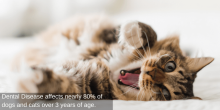By Nicole Abrego
There are many aspects of our pet’s health that we have to keep track of, such as vaccine schedules, annual/bi-annual exams, and grooming appointments. But many of us tend to forget that our pet’s dental care is a crucial part of their overall health as well.
National Pet Dental Health Month takes place every February and helps raise awareness about the importance of keeping up with our pet’s dental care. Poor dental hygiene can lead to a variety of painful health problems for both cats and dogs, so being proactive about your pet’s dental care can really make a difference in preventing dental disease and help increase their quality of life.
What are the Signs of Dental Disease?
Does Fido or Fluffy have a case of bad breath? Believe it or not, bad breath is one of the early signs of dental disease. According to the American Veterinary Medical Association (AVMA), dental disease affects nearly 80% of dogs and cats over the age of 3 and is one of the most common problems that our pets face.
Signs of dental disease include:
- Halitosis (bad breath)
- Swollen or bleeding gums
- Excessive drooling (with or without blood)
- Unwillingness to eat harder foods
- Pawing or rubbing at the muzzle or mouth
- Difficulty opening or closing mouth
If your pet is experiencing any of these signs, they should be seen by their veterinarian immediately.

What are the Risks of Dental Disease?
The ultimate culprit of dental disease in pets is plaque buildup due to lack of regular teeth brushing or dental cleanings. Plaque buildup can lead to gingivitis, a gum disease that is characterized by the swelling and redness of the gums. Gingivitis can eventually progress into advanced periodontal disease that causes the inflammation of the tooth’s support with the inclusion of bone loss. Periodontal disease is highly common in pets and can result in loose and painful teeth. Our pets can’t directly tell us when they are in pain and eventually learn to live with the chronic pain, which is not ideal for them at all.
Advance dental disease can affect more than just your pet’s mouth. If left untreated, periodontal disease can affect internal organs such as the heart, kidneys and liver. “The bacteria in the oral cavity of a pet with periodontal disease can be released into the circulatory system and travel throughout the body.” (Source: DVM360) Bacteria eventually travels into internal organs such as the heart or kidneys, invades them, and causes damage to these vital organs over time.
How Can Dental Disease Be Treated/Prevented?
Scheduling regular dental exams and professional cleanings are the best defense against dental disease. At The Drake Center we offer Comprehensive Oral Health Assessment and Treatment (COHAT) procedures, which are very different than the dental services offered at most other practices. These procedures include using state-of-the-art digital x-rays so our team is able to see what is going on below the gumline, which helps identify dental issues that may otherwise go unnoticed.
During the dental procedure, the doctor will perform a full oral exam, checking each tooth for injury or disease and examine your pet’s overall oral health. Once the assessment is complete, your pet’s teeth are cleaned by hand, polished, and a fluoride treatment applied. Our dental procedures are performed under general anesthesia, which is considered very safe for pets with the use of thorough monitoring and care during the procedure. During recovery, your pet will continue to be monitored closely and snuggled by our caring team.
Taking Care of your Pet's Teeth isn't Just for February

Although February is Pet Dental Health Month, your pet’s daily dental routine should be year-round, just like us humans. Daily brushing of your dog or cat’s teeth can help keep your pet’s teeth looking and feeling great in-between dental cleanings.
By using a toothbrush and toothpaste specifically made for pets, daily brushing can help prevent plaque buildup on your pet’s teeth and gums. This will in turn help decrease the chances of your pet developing Gingivitis. You can find how-to videos on how to brush your dog’s teeth here and how to brush your cat’s teeth here.
To celebrate Pet Dental Health Month, The Drake Center is offering $25 OFF your pet’s dental cleaning when you bring them in during the month of February.
To book your pet’s dental cleaning or to schedule their next exam, please contact us today.
The Drake Center for Veterinary Care is an AAHA-accredited animal hospital located in Encinitas, CA. The Drake Center loves being a source of information for all pet owners across the country however if you have any questions regarding pet care and do not live in Encinitas, CA or surrounding cities, we encourage you to contact your local veterinarian.

